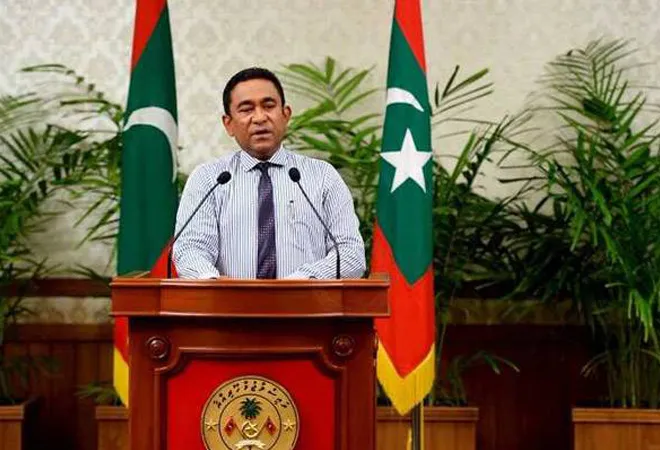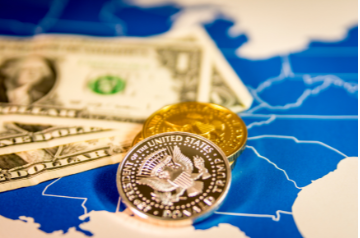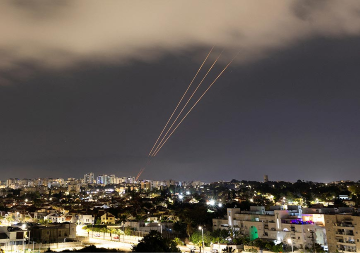
The unanimous verdict of a three-judge Bench of the Maldivian Supreme Court, acquitting jailed former President Abdualla Yameen in the million-dollar ‘money-laundering case’ when he was in power, throws up possibilities for the future, as much for the nation’s India relations as for its domestic politics. In the immediate context, the acquittal removes the disqualification on Yameen from contesting the 2023 presidential polls, imposed by law following the lower courts’ conviction, five-year jail-term and US $5 million in fine, and his aquittal is also accompanied by his revival of the PPM-PNC combine’s ‘India Out’ campaign, modified lately as ‘India Military Out’ campaign.
In the verdict, pronounced on 30 November before the court recessed for the year-end vacation, the Justices blamed it on ‘shoddy investigations’ and also the ‘questionable credibility’ of two main witnesses, including Ahmed Adeeb, the second of Yameen’s three vice-presidents, who have been punished for their part in the crime. In particular, the Judges cited the discrepancy in the number of the cheque used to transfer US $ 1 million into Yameen’s personal account, in two different documents submitted to the court. Incidentally, the court held an ‘additional hearing’ after reserving judgment earlier in November, to re-hear the old arguments on this question.
Can’t be touched again…
Following the verdict, Yameen breathed free air after 732 days, or two years and four months—the last few months spent in house-arrest, permitted under the penal laws. Appearing in public at the PPM office a day later, Yameen declared that he ‘had not touched State funds, nor can I be touched a next time as well’ on similar charges.
Post-verdict, Yameen’s lawyer, Dr Mohamed Jameel Ahmed, once the first estranged vice-president, claimed that the government of President Ibrahim Solih led by the latter’s Maldivian Democratic Party (MDP) had filed this and two other money-laundering cases against his client, ‘not because there was evidence but because they wanted to discredit him in the eyes of the public’. After Jameel pointed to the absence of security for Yameen after his release, the MNDF activated security protocols.
Parliament Speaker and MDP president, Mohammed ‘Anni’ Nasheed, claimed that after the SC verdict, even the Opposition acknowledged his party’s agenda for ‘reforming the judiciary’.
Likewise, after media reports spoke about the non-provision of pension and other benefits for Yameen in Budget-2022, as a jailed former president was not entitled to the same, the government clarified that it would be paid from contingency funds. Yameen lawyers have since filed claims for MVR 2.4 m in back privileges for the jailed period.
Other leaders of Yameen’s PPM-PNC coalition described the verdict as ‘victory for truth and justice’. From the government side, Parliament Speaker and MDP president, Mohammed ‘Anni’ Nasheed, claimed that after the SC verdict, even the Opposition acknowledged his party’s agenda for ‘reforming the judiciary’. Alliance ministers, Yumna Maumoon (MRM) and Ali Solih (JP) said that the verdict proved that President Solih did not ‘interfere’ with the judiciary.
The local media also drew a parallel to the February 2018 SC verdict that freed self-exiled Nasheed, originally under ‘prison leave’ in the UK, where he obtained ‘political asylum’, through an order posted on the court’s website without a full hearing, followed by President Yameen promulgating emergency, arresting one of the judges, and having the earlier verdict reversed by the down-sized Bench. The court reversed this verdict after Yameen lost Elections-2018 months later, leading to Nasheed’s ‘free return’ home, winning a parliament seat and becoming Speaker the next year.
Pressure is on MDP
Though the SC has ruled that the State was free to re-investigate the case against Yameen, political pressure now would be too much for other stakeholders. Post-verdict, however, a criminal court in capital Malé barred Yameen from travelling overseas, pending the other two cases. There is, thus, no denying an invisible Damocles’ Sword hanging over Yameen.
The immediate fallout of Yameen’s freedom will be felt more in the ruling MDP and the party-led coalition than by his PPM-PNC Opposition combine. Factionalism identified with old friends Solih and Nasheed have embarrassed the coalition and frustrated the party’s ‘pro-democracy’ supporters so much that many had stayed away from the nation-wide local government polls in April, contributing to the party’s defeats. This was followed by a poor turnout in the MDP’s organisational elections in September. Against this, there is nothing to suggest that Yameen’s 42-percent ‘development-centric’ vote-share from the lost elections of 2018 has undergone substantial depletion.
Factionalism identified with old friends Solih and Nasheed have embarrassed the coalition and frustrated the party’s ‘pro-democracy’ supporters so much that many had stayed away from the nation-wide local government polls in April, contributing to the party’s defeats.
Apart from allegations of ministerial corruption, where again he is the crusader, Nasheed’s demand for a nation-wide referendum before 2023 presidential polls, to change governance system from presidential form to parliamentary scheme, is problematic. The MRM, JP and religion-centric Adhaalath Party (AP) allies stand stoutly for continuing the presidential scheme. As President Solih’s 58-percent vote-share in 2018, read with the MDP’s stand-alone 46-percent in the 2019 parliamentary polls showed and the low cadre morale at present, the party needs the allies even more for 2023 than in the past. Or, so it seems.
‘Defend Maldives’ campaign
Freedom for Yameen has caused eyebrows to raise in Malé, also over the nation’s India relations. Through the past year, the PPM-PNC Opposition has hijacked the supposedly independent ‘India Out’ social media campaign, targeting the nation’s defence ties with the closest neighbour and extended to cover the US$ 140 million development aid under the Solih presidency.
There is little acknowledgement that the Indian aid package was available to the Yameen presidency too, but the government at the time was busy ousting Indian infrastructure major, GMR, first, followed by the afterthought of a demand for New Delhi taking back the gifted Dornier aircraft, with Indian personnel, and under the exclusive command of the Maldivian National Defence Force (MNDF). To this, the Opposition has lately added the UTF agreement for India constructing an exclusive dockyard for the Maldivian Coast Guard in Uthuru Thila Falhu island.
In his one-and-half-hour speech at a PPM-PNC rally in his honour, Yameen later claimed authorship and ownership of the ‘India Out’ campaign from prison, and launched what he called the ‘Defend Maldives’ campaign. “We respect the friendly people of India, but the Maldives is an independent nation,” he said. “I am saying this officially. Indian military will have to leave Maldives… We don’t want a single Indian military personnel, not just their boots but not even their socks, to remain here on our soil,” he declared.
By targeting India and swearing in the name of Islam, Yameen seems hopeful of reviving his camp’s ‘Islamic nationalist’ chant from the long run-up to the successful 2013 presidential poll campaign.
In a loaded statement subject to multiple interpretations, he ‘reminded’ MNDF soldiers that they too are Maldivians and their loyalty is not to the Government, but Islam, as they had sworn in the name of Allah, and to the people and the nation as stated in their oath. By targeting India and swearing in the name of Islam, Yameen seems hopeful of reviving his camp’s ‘Islamic nationalist’ chant from the long run-up to the successful 2013 presidential poll campaign.
No compromise
A day before the SC verdict, however, Parliament voted in favour of the House Security Services Committee’s (241 Committee) findings that the UTF agreement did not compromise the nation’s sovereignty and security. Non-participation by 27 members excluding the Speaker in the 87-member House showed that the 53-6 vote also proved Solih’s claim that mainstream Maldives was with it and only the periphery made noise. Committee chairman Mohamed Aslam has since reiterated that there was ‘nothing risky in the agreements with India’ but the ‘India Out’ campaign was risky, instead.
There is also a motivated misconception in some quarters that India’s relations with Maldives was personality and party-centric. Unlike the unsubstantiated social media claims, the Indian Navy’s first-time invitation for a foreigner, Defence Minister Mariya Ahmed Didi, to be the chief guest in the passing-out parade at the Naval Academy in Ezhimala, was an extension of New Delhi’s ‘Neighbourhood First’ policy. After the ceremonial salute, Minister Mariya, who also met with Maldivian trainees at the Academy, declared that bilateral defence cooperation was ‘mutually beneficial’ (and not one-sided).
Earlier, flagging off the tri-nation ‘Dhosti XV’ coast guard exercises also involving common neighbour Sri Lanka, in Malé, the minister seemingly underscored the increasing relevance of defence cooperation arrangements with the region’s power-house, India. She pointed out how nations have to work together to maintain regional stability. The history of the Dhosti (friendship) exercises should prove the minister right.
Launched in 1991 by India and Maldives, the exercise followed New India militarily neutralising a coup-bid by Sri Lankan Tamil mercenaries to overthrow President Maumoon Abdul Gayoom three years earlier (‘Operation Cactus’). Decades later, given the topography and demography, Maldives is years, if not decades, away from independent ability to secure its vast EEZ from international drug syndicates, possible maritime terrorists of the future, without external assistance.
Both are inter-connected, and per capita drug-consumption and ISIS terror-participation against population numbers in Maldives is among the highest in the world. Incidents like the targeted 6 May bomb-attack on Speaker Nasheed have highlighted how regional cooperation may have to extend beyond the maritime domain, to include shared internal security concerns, but devoid of ‘non-regional players’ with their geo-strategic agenda, unconnected to the shared IOR in general and Maldives in particular.
The views expressed above belong to the author(s). ORF research and analyses now available on Telegram! Click here to access our curated content — blogs, longforms and interviews.




 PREV
PREV


